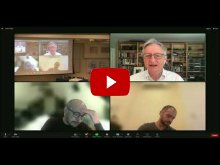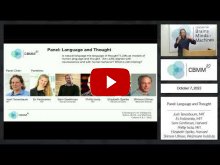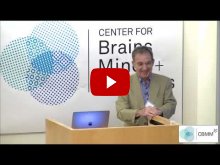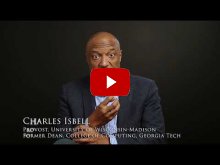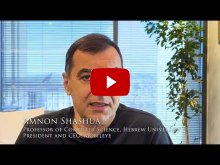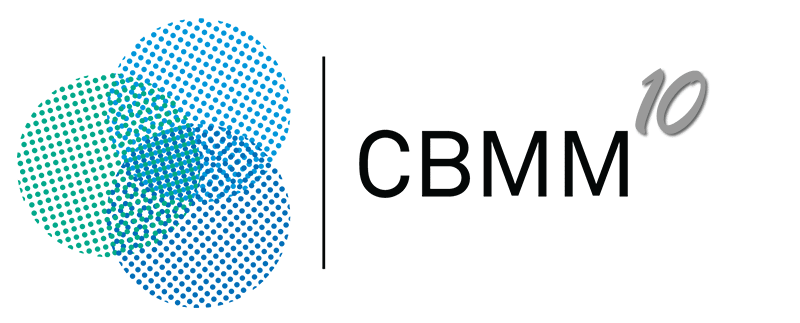
CBMM10 - A Symposium on Intelligence: Brains, Minds, and Machines
The dream of understanding the mind and the brain and replicating human intelligence in machines was at the core of several new fields created at MIT during the ‘50s and ‘60s, including information theory, cybernetics, and Artificial Intelligence. The same dream was at the core of the NSF-funded, multi-institutional Center for Brains, Minds, and Machines (CBMM) and of its integration in the new Quest for Intelligence, which is bridging faculty across all the Schools of the Massachusetts Institute of Technology.
Our symposium will focus on the topic of intelligence – one of the greatest problems in science and engineering and a key to our future as a society. The symposium will look at the past, in particular at the advances achieved by CBMM over the past 10 years. But, it will mainly focus on the future, in particular the future of neuroscience (Brains), the future of cognitive science (Minds), the future of AI (Machines) and their synergies.
Dates: October 6th & 7th, 2023
Location: Singleton Auditorium (46-3002)
Registration is now closed.
Note: Overflow viewing will be available for unregistered attendees in the Picower Seminar Room (46-3310), located on the third floor of MIT Bldg. 46. Preference will be given to the registered guests, with name badges, in both Singleton Auditorium seating and the catered lunch. Please be respectful of the registered guests.
The goal of the workshop is to celebrate CBMM’s success, and to explore the future of CBMM and Quest, in pursuing the natural science of intelligence and investigating its synergies with AI. Deep learning was inspired by neuroscience and led to a better computational understanding of primate perception. It also led to surprising engineering advances such as AlphaGo, Alphafold, and LLMs. This symposium aims to take stock of what has been scientifically accomplished via that framework, to illuminate what still must be accomplished, and to chart next steps by discussing and debating which of the current approaches are likely to achieve those scientific accomplishments.
Schedule
| DAY 1: | Friday, October 6, 2023 |
| 2:30 pm to 2:45 pm | Welcome |
| Tomaso Poggio, CBMM Phil Regalia, NSF Dan Huttenlocher, MIT Schwarzman College of Computing |
|
| 2:45 pm to 4:00 pm | CBMM after 10 years — the Quest now |
| CBMM faculty (T. Poggio, B. Katz, A. Barbu, J. DiCarlo) | |
| 4:00 pm to 4:30 pm | Break |
| 4:30 pm to 6:00 pm | Interacting with the physical world |
| Which aspects of human intelligence require embodiment? Motor control: was it the key for development of human intelligence? Is embodiment necessary for consciousness? | |
| Panel Chair: D. Rus Invited Panelists: M. Jazayeri, L. Kaelbling, M. Raibert, M. Wilson |
|
| DAY 2: | Saturday, October 7, 2023 |
| 9:15 am to 9:30 am | Welcome |
| 9:30 am to 11:00 am | Neuroscience to AI and back again |
|
Review of progress and success stories in understanding visual processing and perception in primates and replicating it in machines. Key open questions. Synergies. |
|
| Panel Chair: J. DiCarlo Invited Panelists: I. Fiete, N. Kanwisher, C. Koch, T. Konkle, G. Kreiman |
|
| 11:00 am to 11:15 pm | Break |
| 11:15am to 12:45 pm | Language and Thought |
| Is natural language the language of thought? LLMs as models of human language and thought. Are LLMs aligned with neuroscience and with human behavior? What is still missing? | |
| Panel Chair: J. Tenenbaum Invited Panelists: E. Fedorenko, S. Gershman, P. Isola, E. Spelke, S. Ullman |
|
| 12:45 pm to 2:00 pm | Break |
| 2:00 pm to 3:30 pm | Research on Intelligence in the Age of AI |
|
On which critical problems should Neuroscience, Cognitive Science, and Computer Science focus now? Do we need to understand fundamental principles of learning -- in the sense of theoretical understanding like in physics -- and apply this understanding to real natural and artificial systems? Similar questions concern neuroscience and human intelligence from the society, industry and science point of view. |
|
| Panel Chair: T. Poggio Invited Panelists: D. Hassabis*, G. Hinton*, P. Perona, D. Siegel, I. Sutskever*,(A. Shashua) |
|
|
Note: The names above indicated with an asterisk (*) will be joining the workshop remotely. |
|
| 3:30 pm to 4:15 pm | Closing Remarks |
ChatGPT provided CVs for the panelists:
Interacting with the physical world
Mehrdad Jazayeri is an esteemed figure in the Department of Brain and Cognitive Sciences at MIT, where he delves into the intricate mechanisms underlying temporal processing and decision-making in the brain. He directs the Jazayeri Lab, which uses a combination of experimental and computational methods to understand neural and cognitive mechanisms of time perception. Jazayeri's groundbreaking work seeks to bridge the gap between neurobiology and cognitive behavior, shining light on how the brain constructs time and anticipates future events.
Leslie Kaelbling has consistently pushed the boundaries in the realms of robotics and artificial intelligence. As a Professor in Computer Science and Engineering at MIT, she's been at the helm of innovations in decision-making under uncertainty and learning for autonomous robots. Her dedicated pursuit for robust robot intelligence has earned her the recognition as an Associate Director of the MIT Quest for Intelligence and a member of the Computer Science and Artificial Intelligence Laboratory (CSAIL).
Marc Raibert is often hailed for his pioneering efforts in robotics, especially in the domain of dynamic legged locomotion. As a Professor Emeritus at MIT and the founder of Boston Dynamics, his legacy encompasses an array of robots that can run, hop, and execute acrobatic maneuvers. The culmination of Raibert's research at the Leg Laboratory at MIT and his ventures with Boston Dynamics has radically shaped the trajectory of robotics, bringing forth robots that interact with the world in unprecedented ways.
Matthew Wilson stands out as a stalwart in the field of neuroscience at MIT, where he contributes deep insights into the function of the hippocampus in learning and memory. His exploration of the role of sleep in memory consolidation has challenged traditional paradigms. Heading the Wilson Lab, he uses neural decoding techniques to interpret memory and decision-making processes, underscoring the profound influence of the hippocampus and the cortex in shaping our cognitive experiences.
Daniela Rus embodies the spirit of innovation at MIT, where she serves as a Professor of Electrical Engineering and Computer Science. Beyond her professorship, Rus leads as the Director of CSAIL, spearheading a wide range of projects in robotics and artificial intelligence. From self-assembling robots to autonomous vehicles, her vision and leadership have paved the way for myriad breakthroughs that strive to make machines better allies to humans in navigating the challenges of the world.
Neuroscience to AI and back again
Ila Fiete is a prominent figure in computational and theoretical neuroscience, where her work seamlessly intersects biology, physics, and computational approaches. As a faculty member at MIT, Fiete's research illuminates the fundamental principles governing brain computations, from neural circuits in navigation to memory storage and retrieval. By leveraging mathematical models and analytical tools, she provides invaluable insights into the brain's sophisticated computational capabilities.
Nancy Kanwisher has carved a niche at MIT with her deep explorations into the human mind's architecture. A Professor in the Department of Brain and Cognitive Sciences, Kanwisher's meticulous research on functional MRI has led to the discovery of specific brain regions, such as the fusiform face area, involved in face recognition. Her pursuit of understanding the specialized regions of the human cortex has redefined perceptions of neural organization and cognitive functions.
Christof Koch stands at the intersection of philosophy, biology, and technology, consistently advancing the understanding of consciousness. Renowned for his tenure as a Professor at Caltech and his leadership roles at the Allen Institute for Brain Science, Koch's journey into the neural and computational basis of consciousness is internationally recognized. His collaborations with figures like Francis Crick have only solidified his influence in both theoretical and experimental neuroscience.
Talia Konkle has established herself as a luminary in the realm of cognitive neuroscience at Harvard University. Her in-depth explorations into the nature of visual object representation, categorization, and how humans mentally organize the world around them are pivotal. By leveraging neuroimaging techniques, Konkle's research demystifies how conceptual relationships between objects shape their representations in the brain, influencing visual and cognitive experiences.
Gabriel Kreiman offers a unique blend of computational modeling and experimental neurobiology at Harvard Medical School. His research focuses on the intricate mechanisms of object recognition, visual attention, and consciousness. Through collaborations with neurologists and neurosurgeons, Kreiman employs a multi-dimensional approach, from single neuron recordings to machine learning algorithms, to decode the neural pathways of human vision and cognition.
James DiCarlo is a powerhouse in the field of visual neuroscience. As a Professor at MIT, DiCarlo's research delves deep into the brain's visual processing hierarchy, deciphering how it transforms visual signals into neuronal patterns that lead to perception and action. His leadership of the DiCarlo Lab and numerous pioneering projects has provided a comprehensive understanding of the neural computations underlying object recognition, ultimately aiming to develop biologically-inspired artificial intelligence systems.
Language and Thought
Evelina Fedorenko has made an indelible mark in cognitive neuroscience with her intense focus on the human language system. As a faculty member at MIT, Fedorenko's work meticulously investigates the neural substrates underpinning language processing, drawing a distinct line between general cognitive abilities and language-specific regions in the brain. Through advanced imaging techniques, she offers unparalleled insights into the universality and specificity of our language faculties.
Samuel Gershman stands at the confluence of computational modeling and cognitive neuroscience. As a faculty member at Harvard University, Gershman's research probes the computational principles underlying learning, reasoning, and decision-making. His application of machine learning tools and Bayesian models paints a comprehensive picture of human cognition, revealing how we learn from our environment and predict future occurrences.
Phillip Isola, positioned at MIT, navigates the fascinating terrains of computer vision and machine learning. His endeavors primarily aim to demystify visual perception's intricate processes, bridging the gap between human and machine perception. Isola's pioneering work on image-to-image translation techniques and explorations into how neural networks perceive and interpret images is pivotal in shaping contemporary artificial intelligence.
Elizabeth Spelke is a cornerstone in the field of cognitive psychology. A Harvard professor, Spelke's illustrious career is dedicated to understanding the cognitive capacities of infants, dissecting the core knowledge with which humans are born. Her groundbreaking studies into spatial cognition, numerical understanding, and social cognition in infants have provided profound insights into the innate building blocks of human cognition.
Shimon Ullman has been an instrumental figure in the realm of computer vision and human visual perception. At the Weizmann Institute and as a visiting professor at MIT, Ullman's work elegantly melds computational and cognitive approaches, unearthing the algorithms and representations that enable high-level visual perception. His contributions span the development of the intermediate visual representations theory and insights into object recognition and visual cognition.
Joshua Tenenbaum, a renowned figure at MIT, consistently pushes the boundaries of cognitive science and artificial intelligence. Tenenbaum's research is rooted in understanding human cognition's computational basis, particularly how we learn, reason, and perceive the world. By interweaving probabilistic models, Bayesian inference, and developmental psychology, he crafts a holistic understanding of human intelligence while driving forward the mission to build more human-like machines.
Research on Intelligence in the Age of AI
Demis Hassabis is the co-founder and CEO of DeepMind Technologies, where he has made pioneering advancements in deep learning, especially with projects such as AlphaGo. Before his AI ventures, he was a successful game designer and later transitioned to neuroscience, earning his Ph.D. in Cognitive Neuroscience from University College London. His innovations and influence earned him a spot on Time's list of 100 most influential people.
Geoffrey Hinton, often referred to as the "Godfather of Deep Learning," is an Emeritus Professor at the University of Toronto and also serves as a VP and Engineering Fellow at Google. His significant contributions to neural networks and the co-invention of the backpropagation algorithm have cemented his place as a leader in the machine learning domain. In recognition of his work, he was awarded the prestigious Turing Award in 2018.
Amnon Shashua holds multiple titles as co-founder, CTO, and Chairman of Mobileye, a company at the forefront of autonomous driving technology. Concurrently, he serves as a Professor of Computer Science at the Hebrew University of Jerusalem. Over the years, Shashua has successfully co-founded AI startups and is known for his deep expertise in machine learning and computer vision.
Pietro Perona is a professor at Caltech. He is renowned for his pioneering contributions to computer vision and computational neuroscience. Over his illustrious career, Perona has played a pivotal role in advancing object recognition, texture analysis, and vision science research. Besides his academic endeavors, he has also engaged with the broader scientific community, influencing the next generation of researchers and shaping the future of vision technology. With numerous publications and accolades, Pietro Perona's work is a testament to his deep expertise and commitment to the field.
David Siegel is a name synonymous with the intersection of finance and technology. As the Co-founder and Co-Chairman of Two Sigma Investments, he has championed the use of technology and data science for systematic trading. With a background rooted in a Ph.D. in Computer Science from MIT, Siegel earlier shaped his quantitative finance prowess at firms like Tudor Investments and D. E. Shaw & Co. He remains a prominent advocate for the integration of data in the financial landscape.
Ilya Sutskever, a leading figure in the AI community, co-founded OpenAI and currently serves as its Chief Scientist. He has left an indelible mark on deep learning and neural networks, with contributions like the development of the AlexNet. His time at Google as part of the Google Brain team further solidified his reputation. Sutskever continues to be a driving force in the AI research domain.
Tomaso Poggio enjoys a distinguished position as the Eugene McDermott Professor in the Department of Brain and Cognitive Sciences at MIT and stands as the Founding member of the McGovern Institute for Brain Research. His seminal work in biologically-inspired machine learning and computational neuroscience sets him apart. Poggio also leads the charge as the co-director of the Center for Brains, Minds, and Machines, receiving numerous accolades for his work on neural networks and machine vision.

